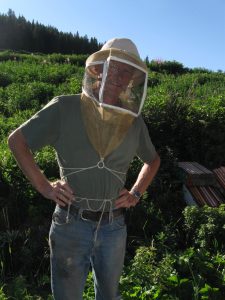By: Ed Colby
At the turn of the century, Derrick Maness and I worked together for Colorado commercial beekeeper Paul Limbach. Derrick still does. I’ve watched Derrick evolve from an exuberant teenager obsessed with bugs, to a successful commercial apiarist with thousands of colonies in his care.
I’m lucky, because he’s a neighbor, friend and mentor, and he knows bees.
One October evening we sat around the kitchen table, and he told me how he did it. He started at the beginning.
I had a wonderful seventh-grade science teacher who had an observation hive in our classroom. The bees’ exit went right out the window outside. My assigned seat was right where the beehive was, for about a month, and I didn’t do well at all in class, until the teacher figured out I couldn’t focus on him while the “bee TV” was right in front of me. He was an entrepreneur, and he owned all the soda machines in the school, so he worked a deal with me — if I stocked the machines every day, he would give me a soda and I would get to feed the bees in the wintertime. That’s how I got into bees.
When did you start working for Paul?
Freshman year, when I was 14 years old.
So you worked bees all through high school?
Yeah, Summers, then weekends extracting in the Fall. Then I moved away to Fort Collins for two, three years, came back, and wondered if Paul would hire me again. I worked for him for about three months, and then I called up Kona Queens in Hawaii. They said, “Can you be here next week?”
I felt so bad, leaving Paul in August, right at honey pulling season, but he said, “Go, go, go!” I was in Hawaii (raising queens) for almost three years.
When I got back, I went back to work for Paul, and that’s where I’ve been since.
Tell us about the time you almost quit beekeeping.
The natural gas industry was very heavy at that time, and I was getting job offers for like 30 to 60 dollars an hour. I was teeter-tottering on quitting, and I was getting myself ready to tell Paul I can’t do this anymore, when that stupid Wild Mountain Honey song came on the radio, and I heard those lyrics, and I just went, “All right, God.” Coincidence? I don’t know. But I realized there’s nothing like our job. You gotta love it (laughing).
What do you do in the California almonds?
Oh man, protect our bees. That’s what I feel like I try to do. We put all our bees on 18-wheelers and coordinate that circus, and it’s a 16-hour drive straight from here to Chowchilla or Madeira, about an hour north of Fresno, in the Imperial Valley. From what I understand, 1.1 million acres of almonds out there. It’s something to see. It’s crazy. I can’t explain it. It’s agricultural and the city, mixed together. It’s not exactly what I like, to be honest. And so that’s why I go there with my bees, to experience it with them, and then get them the heck out of there. I go out there, I do mite sampling, keeping the mite numbers down and then doing the basics of monitoring for food and anything else we can see. Yeah, we go through 3,000 colonies, we grade them two to three times when we’re out there, we give them three pounds of pollen each time. We go through each colony and check its individual needs, be it diseases, parasites, viruses or food. Yeah, it’s a lot of backbreaking work. It feels like going back to football. And then you have to figure out how to coordinate getting the bees into these orchards. There’s a lot of obstacles you just don’t think of, and you’re doing this in the dark. And then there’s the fog. You’ve got 196 colonies on a 22-foot truck with a forklift on a trailer behind it. It’s pretty nerve wracking.
The bees sit there in the orchards from about the first week in February until the first week in March. Then we go back out there. We’ll load ‘em back onto trucks and get them back to holding yards and coordinate the 18-wheelers to send them back to Colorado.
So what’s your relationship to Paul? Are you his foreman?
We’re more of a team. I compare it to a baseball or football team. Paul’s the owner. I’m the coach. Things I see that I think we need to improve, I bring up to Paul, and he’s the owner of the operation, and he can trump my ideas, or he can go along with them.
And you have bees of your own.
Right. I run 500-700 hives of my own, so I can make all the mistakes I want on my bees and do things the way I want on my bees, and I can use that knowledge to transfer back over. Every big thing I’ve ever learned is from making a mistake. Having my own bees gives me freedom, because when you work for somebody else, they want you to do it their way. My bees are always an experiment.
A lot of our readers are backyard beekeepers. They don’t have the background you do. You have any tips?
Yeah, you know, read the Bee Journal or the Bee Culture. You’ll get up-to-date information . . .
Go back to the basics. If you’re trying to assess all the problems of the bee hive, you’re going to lose. Like Dave Mendes said at one of the bee meetings, “Keep it simple, Stupid.” That’s how he was able to manage 20,000 colonies.
If you’re ever letting your bees get behind on food, you’re not keeping up with the needs of the bees. I just think that’s a huge one. That’s something I’ve learned through so many slaps in the face.
You’re talking syrup and pollen both.
Yes, whatever their needs are. Pollen patties are great. If you’re a backyard beekeeper, keep a honey super on your hive in the Winter.
And a good queen. I don’t believe in requeening every year. But I do believe in knowing the age of your queen. A first year queen is great. You can make a huge honey crop off them. Same with a second year queen. A third year queen, you might not be able to split ‘em. But if you don’t knock ‘em back, they’ll do great.
The biggest thing to me is mites. Monitor, monitor. Just because a hive looks good, or just because it’s making honey, doesn’t mean something’s not going on.
If people just focus on these three things, the rest falls together.
The fourth thing is shelter. I know it’s easy to get older equipment, but when it’s raining or cold, if you have cracks in your tops, especially if you’re going to California with that much rain, it’s just crazy how much water collects in the hives. Last Winter we had to rake out an inch or two of water in some of them.
I used to chase way too many things. Oh, nosema, or this, this, this…I know problems are out there, but if your bees are well fed, and the mites are low, and it’s a good queen, they usually can combat the other problems.
Ed Colby practices beekeeping in Aspen Mountain, Colorado, where he lives with his partner, Marilyn.










